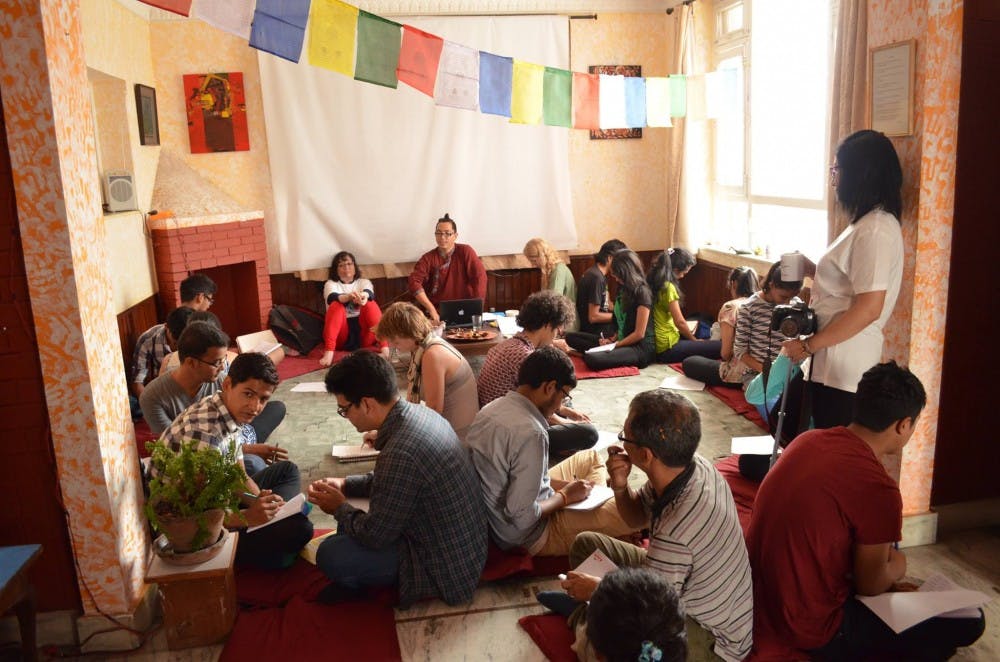After a disastrous earthquake struck Nepal in April 2015, an ASU alum used his love for poetry to bring help and restoration to his home nation.
Samyak Shertok, an ASU alumnus and Nepal native, used an experience that he had with an ASU group to help his native country.
He was a member of Poesía del Sol, a group on campus that partners with the Mayo Clinic to bring students and patients together. Alberto Ríos, who Shertok described as "the mastermind behind the project," said it is a opportunity for the students to get real-life experience with their writing outside of the classroom.
"The writing is so much stronger in so many ways because you’ve been writing through yourself for so long, but now you’re using what you’re good at and it’s not for you," he said. "It’s what I would call reciprocal medicine. Instead of doing something to the patients, we’re asking them to do something for us."
The project consists of students visiting patients at the Mayo Clinic, sitting bedside and talking to them, then writing a piece of poetry about the stories the patients shared. The students then leave the room, type up the poem, print it, put it in a frame and give it to the patient and his or her family.
The poems cover a variety of topics, depending on the stories the patients tell. Some discuss stories from their childhood, some are from earlier that day, and they are all interpreted differently by the poets.
"I always say that medicine has the X-ray and humanity has the poem," Ríos said. "It’s so easy to do – you just sit at the bedside and talk to the people and you take moments that the family doesn’t even recognize. You don’t write their story, you look for what is unanswered or what, and this sounds crass, will go when the person passes."
Ríos said the patients and their families typically love the poems, and often share them at funerals, pass them through the family or hang them up in the home somewhere. It is a priceless gift that takes very few material resources.
One of the greatest impacts he sees, however, is in the lives of his students.
"It is a brave act in a crucial moment and a tender circumstance," Ríos said. "... It changes my students, it really does, and Healing Through Poetry (Shertok's poetry project) in Nepal is a perfect example of that."
When the earthquake hit Nepal, Shertok was still a student at ASU and a member of Poesía del Sol. He said that he was trying to think of ways to help his home country while he was a student who could not contribute much of a monetary donation.
"Being a writer, I decided the best thing I could do was write," he said. "There was a candlelight vigil on Hayden Lawn at ASU and I read a poem there. After I read the poem, people came and told me they felt my pain through the poem."
He said that he did not expect to get such a positive reaction to the poetry, but it was very encouraging. That experience led him to believe that poetry could have a deeper impact on people than he originally thought it could.
Shertok said this, in addition to his experience with Poesía del Sol, led him to think that maybe he could use poetry to help his people.
"Some patients have told me after reading the poem that you bring back so many memories," he said. "Somehow things went very interestingly. 'You were my medicine today.' That was the biggest compliment I got. I was amazed and very pleasantly surprised."
The impact the poetry had on the University led the ASU community to encourage Shertok to expand his project to Nepal.
He knew that he would not be able to afford a trip to Nepal, so Shertok started a Kickstarter page to fundraise the project. Over 60 days, the page raised $5,500 from 57 donators, and was able to make the trip in June 2015.
Kamesh Regmi, one of Shertok's friends and former president of the Nepalese Student Association at ASU, helped organize some other fundraising events, like poetry readings at local book stores. He said he thought the project was a very unique, innovative idea.
"I think it was pretty well-conceived and creative," Regmi said. "It went better than I expected."
Regmi is also a Nepal native, and his parents were in Nepal when the earthquake hit.
"For me, participating in the poetry events was more helpful than I anticipated," he said. "We normally focus on physical aspects of pain, but there's a mental aspect too, and art is a wonderful way to help with that."
While in Nepal, Shertok spoke to many people about their experiences – people who had lost loved ones, lost their homes or were just traumatized by the destruction around them.
He also conducted a three-part Healing Through Poetry workshop, where people of all ages and writing experiences could come learn to put together a poem based on what they had experienced.
The workshop brought in about 15 people per day on average, and on by the third day, each of the participants had drafted a poem. They all wrote their poems in Sharpie on a big piece of white cloth that is now being kept at Shertok's Nepal home.
Shertok said he saw the people coming together for a greater cause, and for that reason, he saw his project as a success.
"We were trying to cope with this tragedy that changed everything and is a part of us now," he said. "Yes we lost many people, but we can’t just try to cover it up. We need to accept it as a part of who we are and part of the history of this country. A big part of this workshop was trying to embrace this tragedy."
Now that he has seen the healing impact poetry can have on people, Shertok said he hopes to expand his project and eventually create the Healing Through Poetry Foundation.
Still in school, he doesn't have the means to go about it now. However, he hopes to eventually branch out and bring his workshops to people throughout the community and, ultimately, the nation as a whole.
"I would like to open it up to everyone," he said. "Maybe a group of us could go to a high school and do a session there. We might go work with autistic kids. We might go to a retirement home.
"There are thousands of rape victims who don’t know how to express themselves, so what if we ran a workshop for them and they were able to express their anger and their feelings through poetry?"
Correction: Due to a reporting error, a previous version of this story incorrectly spelled the name of an ASU student organization. The correct name is Nepalese Students' Association.
Reach the reporter at aegeland@asu.edu or follow @alexisegeland on Twitter.
Like The State Press on Facebook and follow @statepress on Twitter.




